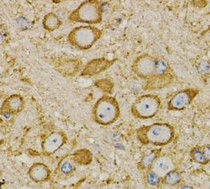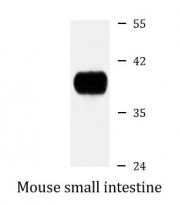ARG57589
anti-MTNR1A antibody
anti-MTNR1A antibody for IHC-Formalin-fixed paraffin-embedded sections,Western blot and Human,Mouse,Rat
Overview
| Product Description | Rabbit Polyclonal antibody recognizes MTNR1A |
|---|---|
| Tested Reactivity | Hu, Ms, Rat |
| Tested Application | IHC-P, WB |
| Host | Rabbit |
| Clonality | Polyclonal |
| Isotype | IgG |
| Target Name | MTNR1A |
| Antigen Species | Human |
| Immunogen | Recombinant protein of Human MTNR1A. |
| Conjugation | Un-conjugated |
| Alternate Names | MEL-1A-R; Mel-1A-R; MT1; Melatonin receptor type 1A; Mel1a receptor |
Application Instructions
| Application Suggestion |
|
||||||
|---|---|---|---|---|---|---|---|
| Application Note | * The dilutions indicate recommended starting dilutions and the optimal dilutions or concentrations should be determined by the scientist. | ||||||
| Positive Control | Mouse small intestine | ||||||
| Observed Size | 39 kDa |
Properties
| Form | Liquid |
|---|---|
| Purification | Affinity purified. |
| Buffer | PBS (pH 7.3), 0.02% Sodium azide, 50% Glycerol. |
| Preservative | 0.02% Sodium azide |
| Stabilizer | 50% Glycerol |
| Storage Instruction | For continuous use, store undiluted antibody at 2-8°C for up to a week. For long-term storage, aliquot and store at -20°C. Storage in frost free freezers is not recommended. Avoid repeated freeze/thaw cycles. Suggest spin the vial prior to opening. The antibody solution should be gently mixed before use. |
| Note | For laboratory research only, not for drug, diagnostic or other use. |
Bioinformation
| Database Links | |
|---|---|
| Gene Symbol | MTNR1A |
| Gene Full Name | melatonin receptor 1A |
| Background | This gene encodes one of two high affinity forms of a receptor for melatonin, the primary hormone secreted by the pineal gland. This receptor is a G-protein coupled, 7-transmembrane receptor that is responsible for melatonin effects on mammalian circadian rhythm and reproductive alterations affected by day length. The receptor is an integral membrane protein that is readily detectable and localized to two specific regions of the brain. The hypothalamic suprachiasmatic nucleus appears to be involved in circadian rhythm while the hypophysial pars tuberalis may be responsible for the reproductive effects of melatonin. [provided by RefSeq, Jul 2008] |
| Function | High affinity receptor for melatonin. Likely to mediates the reproductive and circadian actions of melatonin. The activity of this receptor is mediated by pertussis toxin sensitive G proteins that inhibit adenylate cyclase activity. [UniProt] |
| Calculated MW | 39 kDa |
Images (3) Click the Picture to Zoom In
-
ARG57589 anti-MTNR1A antibody IHC-P image
Immunohistochemistry: Paraffin-embedded Mouse brain tissue stained with ARG57589 anti-MTNR1A antibody at 1:100 dilution.
-
ARG57589 anti-MTNR1A antibody WB image
Western blot: 25 µg of Mouse small intestine lysate stained with ARG57589 anti-MTNR1A antibody at 1:3000 dilution.
-
ARG57589 anti-MTNR1A antibody WB image
Western blot: Rat placental stained with ARG57589 anti-MTNR1A antibody at 1:1000 dilution, ARG65351 Goat anti-Rabbit IgG antibody (HRP) at 1:5000 dilution.
From Jinzhi Li et al. J Reprod Immunol. (2023), doi: 10.1016/j.jri.2023.104166, Fig. 2.B.









